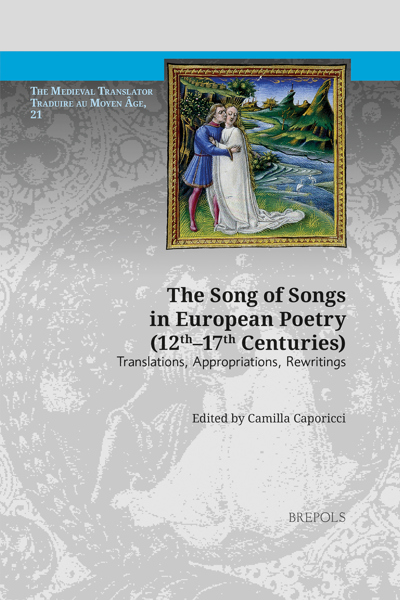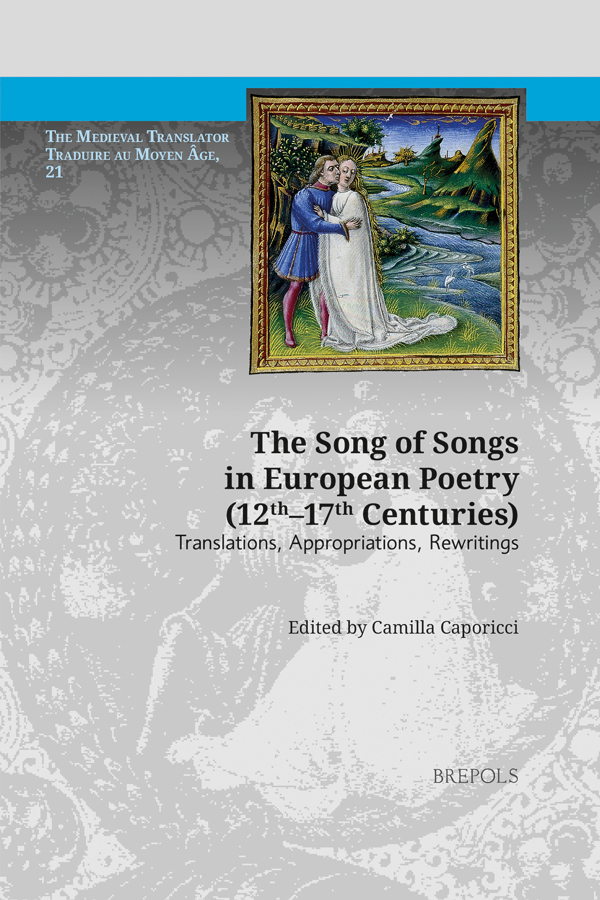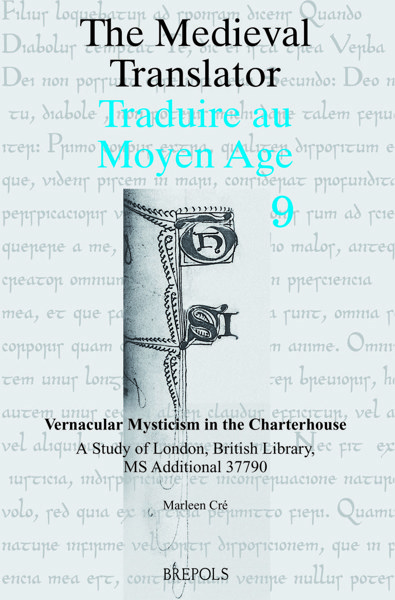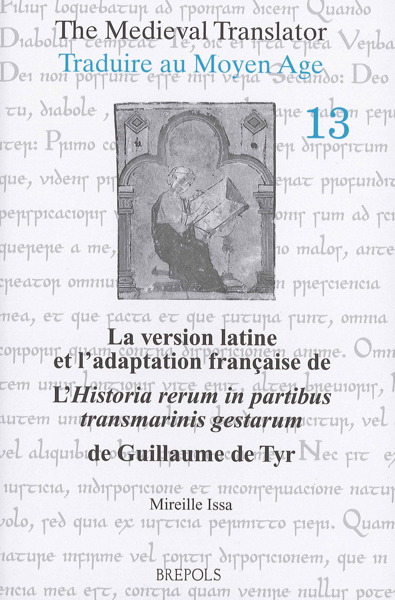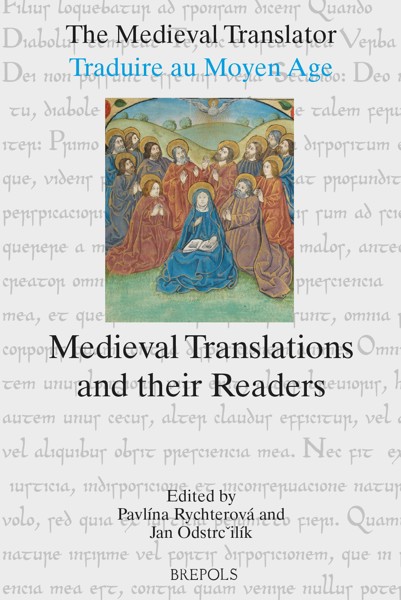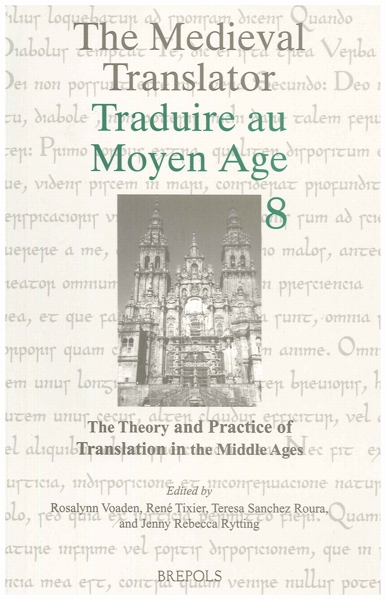
The Song of Songs in European Poetry (Twelfth to Seventeenth Centuries)
Translations, Appropriations, Rewritings
Camilla Caporicci (ed)
- Pages: 295 p.
- Size:156 x 234 mm
- Illustrations:8 b/w, 4 col., 14 tables b/w., 10 Musical Examples
- Language(s):English
- Publication Year:2024
- € 80,00 EXCL. VAT RETAIL PRICE
- ISBN: 978-2-503-60817-4
- Paperback
- Available
- € 80,00 EXCL. VAT RETAIL PRICE
- ISBN: 978-2-503-60818-1
- E-book
- Available
Written by a group of distinguished international scholars, this volume explores the complex and multifaceted processes through which the Song of Songs entered, influenced, and interacted with medieval and Renaissance European poetry.
Camilla Caporicci is Senior Lecturer at the University of Perugia, and a former MSCA Seal of Excellence fellow (University of Padova) and Alexander von Humboldt fellow (Ludwig-Maximilians-Universität München). She has published widely on Elizabethan and Jacobean poetry. Her publications include: The Dark Lady: La rivoluzione shakespeariana nei sonetti alla Dama Bruna (Aguaplano 2013); Sicut Lilium inter Spinas: Literature and Religion in the Renaissance (ed., Utz 2018); Introduction and Notes to Shakespeare’s Sonnets (Bompiani 2019); The Art of Picturing in Early Modern English Literature (ed., Routledge 2020). Her monograph on the Song of Songs in Renaissance love lyric is forthcoming with Oxford University Press.
Traditionally attributed to King Solomon and defined by Rabbi Aqiva as the Holy of Holies among the sacred Scriptures, the Song of Songs is one of the most fascinating and controversial biblical books. Celebrated as a key to the supreme mystery of the union between God and the faithful, this ambivalent book, which combined a sensual celebration of love with a well-established tradition of allegorical interpretation, was a text crucial to both the Middle Ages and the Renaissance, and held a particular appeal for poets. Indeed, the Song of Songs played a significant role in the development of European poetry from its very beginning, creating an exceptional convergence of sacred and secular languages and horizons of meaning.
Written by a group of distinguished international scholars, this volume explores the complex and multifaceted processes through which the Song of Songs entered, influenced, and interacted with medieval and Renaissance European poetry (twelfth to seventeenth centuries). Focusing on both individual authors – including Peter Riga, Dante Alighieri, Richard Rolle, and George Herbert – and particularly relevant poetic traditions – including Hebrew liturgical poetry and the Tristan and Ysolt tradition, Middle English and Petrarchan lyric, Renaissance verse versions and seventeenth-century musical compositions, dissident and prophetic texts – the volume unveils the relevant role played by the biblical book in the development of European poetry, thought and spirituality, highlighting its ability to contribute to different poetic genres and give voice to a variety of religious, political, philosophical, and artistic intentions.
Introduction
Camilla Caporicci
Part I. A Many-Faced Influence: Medieval Voices
Chapter 1. ‘The Song of Songs, gaze upon her’: Antique Hebrew Liturgical Poetry from the Medieval Mainz Rite
Leor Jacobi
Chapter 2. Versifying the Cantica canticorum in the Context of Peter Riga’s Aurora
Greti Dinkova-Bruun
Chapter 3. ‘Like an apple tree among the trees of the forest is my beloved among the young men’: Revisiting the Song of Songs with Tristan and Ysolt
Brindusa Grigoriu
Chapter 4. The Song of Songs’ Lyricism in Late Medieval England
Denis Renevey and Christiania Whitehead
Part II. Poetry and Music: The Italian Tradition
Chapter 5. The Good Sorrow: The Song of Songs in Dante’s Comedy and Contemporary Popular Piety
Lino Pertile
Chapter 6. The Song of Songs in Sixteenth-Century Italian Lyric Poetry
Matteo Navone
Chapter 7. Laetitia et solatio: Singing the Canticles and Female Spirituality in the Early Seventeenth Century
Marina Toffetti
Chapter 8. Motets on the Song of Songs in the Collection Symbolae diversorum musicorum (Venice, 1621) edited by Lorenzo Calvi
Gabriele Taschetti
Part III. Rewriting and Appropriating the Song of Songs in the British Isles
Chapter 9. A Corpus-Based Analysis of the Song of Songs’ Early Modern Translations (1535‒1611)
Fabio Ciambella
Chapter 10. William Baldwin’s Canticles or Balades of Solomon and the Beginnings of English Petrarchism
Rachel Stenner
Chapter 11. A Reading of Joseph Hall’s Paraphrase of the Song of Songs (1609)
Tibor Fabiny
Chapter 12. From the ‘broken Altar’ to ‘The Banquet’ of Love: The Song of Songs in George Herbert’s The Temple (1633)
Carmen Gallo
Chapter 13. The Allure of Canonical Fleshliness: The Song of Songs as Hermeneutic intermédiaire for Ranter Libertarianism and Counter-Ethics
Simone Turco
Chapter 14. Women Prophets, Dissent, and the Song of Songs in Seventeenth-Century England
Adrian Streete
***
Index of Names
